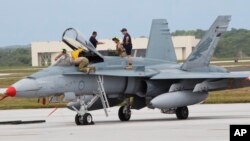Australia will end its airstrikes against Islamic State militant targets in Iraq and Syria after being part of a U.S.-led international coalition for more than two years.
Canberra’s decision to stop its involvement in airstrikes on the insurgents was taken after consultation with Iraq and other allies.
Six Australian fighter jets will be recalled, although refueling and surveillance aircraft will remain in the region.
Australian Defense Minister Marise Payne said their firepower helped to defeat Islamic State, also known as Daesh.
“There is no doubt that our airstrike operations have made a difference to the ability of the Iraqi security forces’ campaign to defeat Daesh and to ensure that the extremists of this organization are prevented from spreading their toxic ideology further across the globe,” Payne said.
Australia sent about 780 military personnel as part of the coalition. Canberra says the work of training and advising of Iraqi forces would continue.
Independent monitoring groups believe that as many as 6,000 civilians have been killed in the U.S.-led aerial bombing campaign in the conflict zone. But coalition commanders have estimated that 800 civilians have died as a result of 28,000 airstrikes.
Earlier this month, Iraqi Prime Minister Haider al-Abadi said that his troops were now in complete control of the Iraqi-Syrian border.
Australia has forces deployed in several locations around the world, including Afghanistan, Egypt and Sudan.












